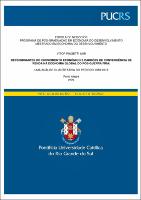| Share record |


|
Please use this identifier to cite or link to this item:
https://tede2.pucrs.br/tede2/handle/tede/11322| Document type: | Dissertação |
| Title: | Determinantes do crescimento econômico e padrões de convergência de renda na economia global do pós-guerra fria : uma análise quantitativa do período 1989-2019 |
| Author: | Aimi, Vitor Piagetti  |
| Advisor: | Bittencourt, Hélio Radke |
| Abstract (native): | O presente trabalho destina-se a auxiliar na compreensão dos padrões econômicos mundiais do Pós-Guerra Fria, caracterizado pela intensa globalização e abertura comercial e financeira. Analisar-se-á a economia internacional de modo integral, e, em seguida, a amostra será categorizada em níveis de renda e sub-regiões geográficas para fins comparativos. Apesar da maior aproximação dos mercados desde o colapso do modelo comunista, não há evidência de maior β-convergência na contemporaneidade ao comparar-se ao período histórico anterior. Há, contudo, maior convergência entre países de renda média-alta e renda média-baixa em relação aos países de alta e baixa renda, tornando a taxa de convergência entre os níveis de renda o formato de um U invertido. O σ-convergência, por sua vez, apresenta queda em todos as categorias de renda, e é mais estável em regiões de pouca integração econômica, tendo maior instabilidade em áreas de maior abertura econômica, revelando a vulnerabilidade sistêmica da economia global contemporânea. |
| Abstract (english): | The present work intends to help in the understanding of the economic patterns in the Post-Cold War era, characterized by the deepening in the globalization process and the commercial and financial integration. The world economy will be analyzed as a whole, and then categorized by income levels and geographic subregions for comparative purposes. Despite the greater integration of markets since the collapse of the communism, there is no evidence of higher rate of β-convergence than that found in XX century. Higher convergence rates have been found among upper-middle-income and lower-middle-income countries when compared with the high-income and low-income economies, making the convergence pattern by income the shape of an inverted U. σ-convergence, in turn, has a different result – although there is a drop in all income groups analyzed, there is a pronounced stability and income cohesion in regions of low income countries, known by the lack of integration with the international economy. Emergent and developed economies present greater chance of income dispersion, highlighting the greater volatility brought by economic integration. |
| Keywords: | Economia Internacional Globalização Geopolítica Convergência de Renda Crescimento Econômico International Economy Globalization Geopolitics Income Convergence Ecoonomic Growth |
| CNPQ Knowledge Areas: | CIENCIAS SOCIAIS APLICADAS::ECONOMIA |
| Language: | por |
| Country: | Brasil |
| Publisher: | Pontifícia Universidade Católica do Rio Grande do Sul |
| Institution Acronym: | PUCRS |
| Department: | Escola de Negócios |
| Program: | Programa de Pós-Graduação em Economia do Desenvolvimento |
| Access type: | Acesso Aberto |
| Fulltext access restriction: | Trabalho não apresenta restrição para publicação |
| URI: | https://tede2.pucrs.br/tede2/handle/tede/11322 |
| Issue Date: | 27-Mar-2024 |
| Appears in Collections: | Programa de Pós-Graduação em Economia do Desenvolvimento |
Files in This Item:
| File | Description | Size | Format | |
|---|---|---|---|---|
| VITOR_PIAGETTI_AIMI_DIS.pdf | VITOR_PIAGETTI_AIMI_DIS | 1.65 MB | Adobe PDF |  Download/Open Preview |
Items in DSpace are protected by copyright, with all rights reserved, unless otherwise indicated.




